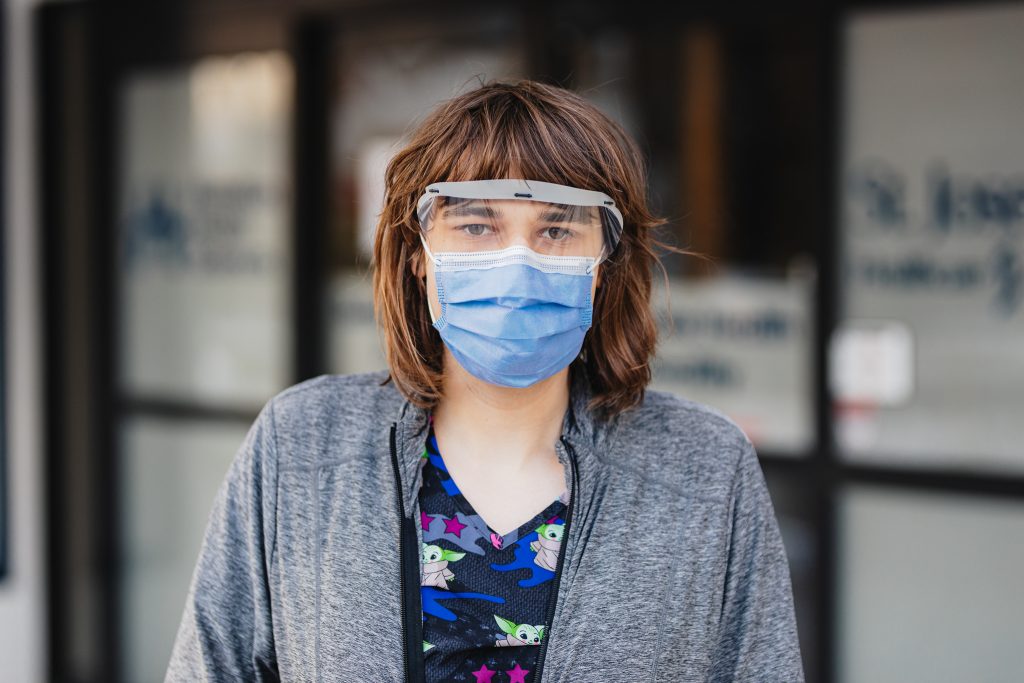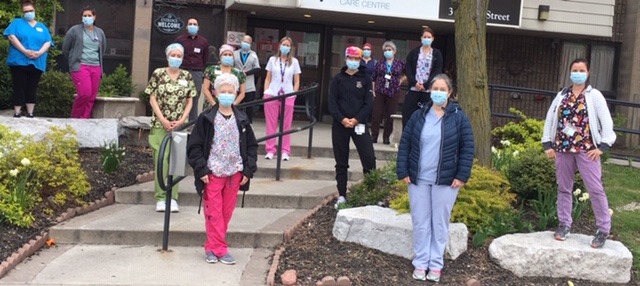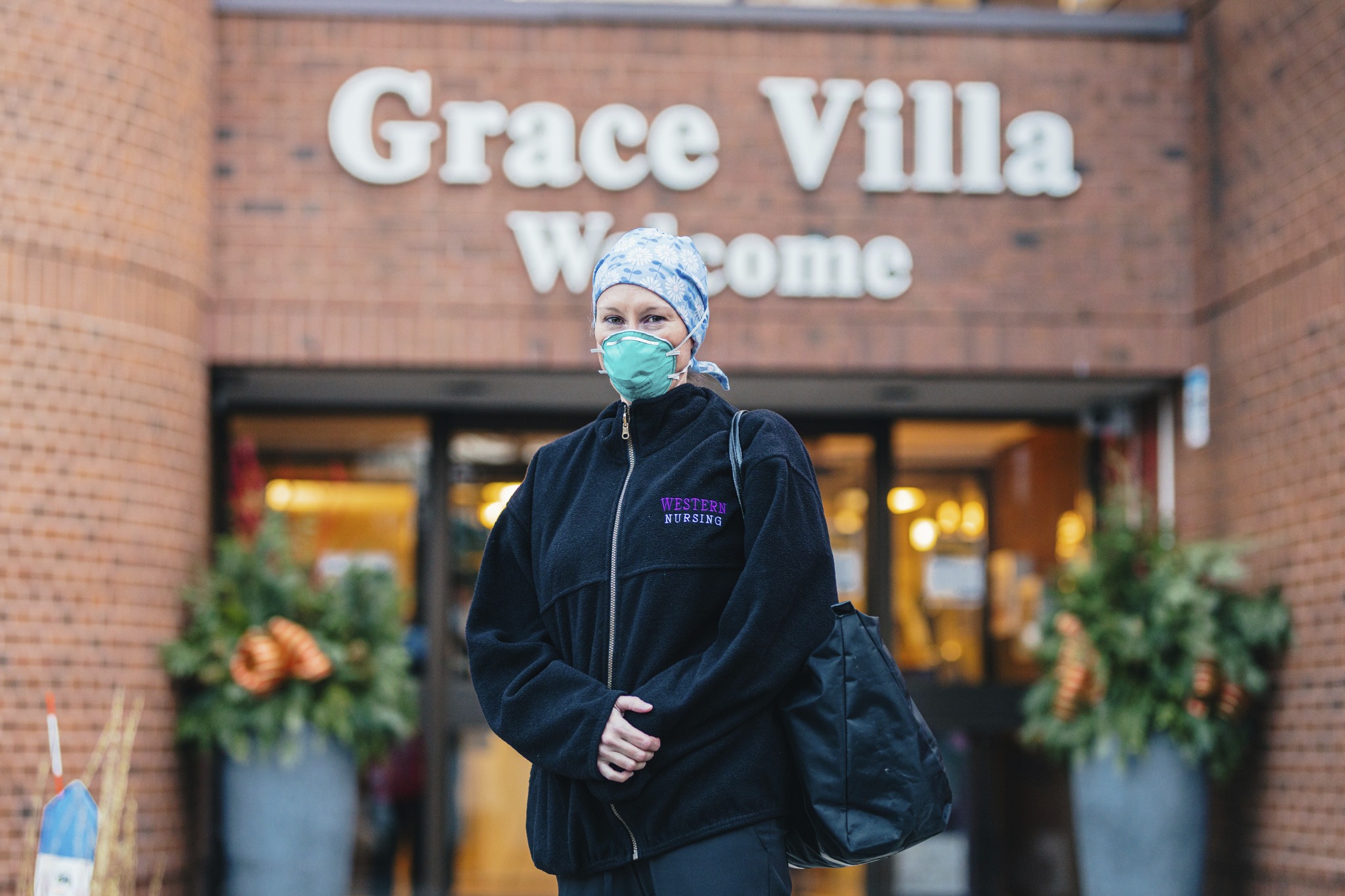
From behind-the-scenes to the front lines
Change can be unsettling. But Hamilton Health Sciences (HHS) occupational therapy and physiotherapy assistant Jazmin Lirios sees the positive side after being redeployed to help the hospital manage pressures caused by the COVID-19 Omicron variant.
Lirios and her colleague Lily Vetzal are among hundreds of HHS staff who have recently stepped into new roles due to high patient admissions coupled with very large staff shortages due to illness.
Prior to redeployment, a typical day for Lirios at the Adult Complex Wheelchair and Seating Clinic included supporting occupational therapists in assessing patient needs and developing solutions for custom wheelchairs and seating equipment.
But for the past three weeks, she has been in an inpatient role, providing care to patients at the Satellite Health Facility. The facility is primarily for patients who do not require hospital care and are awaiting transfer to a community-based location such as a retirement or long-term care residence.
Embracing change
“At first, I was nervous to hear I would be redeployed because I’ve never been redeployed before,” says Lirios, “but I’m really happy that the people I’ve been redeployed to are very supportive and friendly. There was really good orientation. I like it here. I enjoy it.”
Lirios says it helps that she had six years of experience supporting patients with rehabilitation therapy and activities of daily living before coming to HHS to work in the wheelchair clinic about eight months ago.
“At the Satellite Health Facility, I’m helping the rehab staff carry out patient treatments. It could be walking, it could be exercises, it could be helping patients get their independence back with bathing and brushing their teeth,” she says.
“I’m happy that I got redeployed. I met new people from other areas throughout HHS, made new friends and I feel more in touch with the whole organization. Now I know more about what’s going on. Helping with the staffing shortages is a real eye-opener.”
Redeployment has also given Lirios an opportunity to work in a team-based care model, providing her with insights into health care beyond rehabilitation therapy.
Getting comfortable

Vetzal now cares for patients daily
The sea of change brought on by the Omicron wave also swept Lily Vetzal into a temporary new role.
Prior to redeployment, she worked in the prosthetics and orthotics department where her job included filling plaster molds for wrist and ankle braces, helping to build orthotics, and helping to maintain workspaces. This work was largely behind-the-scenes, and she rarely interacted directly with patients. So being deployed to the Satellite Health Facility with Lirios meant a very different kind of work.
“It’s been a huge change in that regard because here my entire job is like a health-care aide or recreational therapist assistant,” says Vetzal, who now regularly interacts with patients. “I also answer call bells and figure out if it’s something I can do like getting water or adjusting something on a patient’s bed. I’m often a second person for two-person tasks like rolling a patient or using a patient lift. It’s been very different and quite the adjustment.”
“We don’t always end up pulling the weight we want to, but instead we move what we can.”
Vetzal says she was given about a week’s notice that she might be redeployed but had no idea what to expect.
“I was very nervous, the first week in particular. It’s extremely different from my other job. But I’m getting more comfortable and more confident, doing more to help,” she says. “Most patients here see everyone as a nurse. But when you explain you’ve been redeployed, they get it and they’re understanding. I had a patient who I helped in the bathroom and she just walked me through it all. I haven’t done that since my niece was little, but it just seems kind of normal now.”
Another challenge for Vetzal was meeting a lot of new colleagues beyond the tight-knit group from the prosthetics and orthotics department. She is transgender and needed to inform and correct people she was meeting for the first time, who would misgender her. With flexible and supportive leadership, she says she’s doing well.
“My new supervisor encouraged me to take breaks so I didn’t get overwhelmed. It’s getting a lot better and most of the staff are super supportive.”
Vetzal sums up the experience for staff deployed to roles so different from their usual jobs this way:
“We don’t always end up pulling the weight we want to, but instead we move what we can.”



